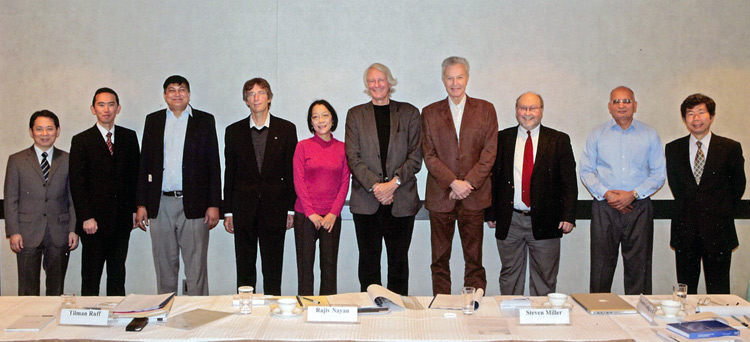"Nuclear Experts Working Group Meeting"
March 10 - 12, 2012
Tokyo, Japan
REAP Tokyo, Japan
Nuclear Experts Working Group Meeting
Tokyo, Japan March 10-12, 2012
Coincidentally on the anniversary of the earthquake and tsunami that caused the disaster in the Fukushima reactor on March 11, 2011, a small group of nuclear experts met in Tokyo to discuss the fragile state of the global nuclear orders. The group concluded that the world is at a critical crossroads on all three dimensions of nuclear policy: the use of civil nuclear energy for electrical power, nuclear nonproliferation, and nuclear disarmament. The Fukushima disaster underlined the importance to the group of preparing for accidents and crises well in advance of the event and for avoiding them altogether wherever possible. It also focused attention on the dangers of proliferation and noted that unless the international community is able to address the drivers of nuclear proliferation and the countries of concern more countries would cross the nuclear threshold. In particular the group directed attention to ways in which the nuclear powers could keep their side of the original NPT bargain and make more rapid and demonstrable progress towards the abolition of all nuclear weapons.
The group met to establish a research and practice agenda for scholars and social movements interested in nuclear disarmament. It mapped out new research on Nuclear Regulation; identified what could be called best Practice in Relation to Disarmament Conventions and what was needed to generate more effective Global governance of nuclear technology. Throughout the discussions attention was paid to the legal obligations of states and the importance of political leaders exercising courage on nuclear questions.
The experts also directed attention to the relationship between real threats, perceived threats and the role of nuclear weapons in national defense doctrines and the specific roles of non nuclear weapon states in addressing the threat perceptions/threat reductions of the nuclear states. Among many other issues discussed there was a major focus on what sorts of political, economic and social conditions would generate a positive environment for negotiations on nuclear weapon free zones in the Middle East and in North East Asia. Strong support was given to a track 1.5 conversation that would bring together academics and policy makers from North East Asia, the United States and Russia to discuss national and regional threat perceptions and ways in which these could be dealt with by non nuclear means.
Although attention was also given to the particular challenges posed by North Korea and Iran, it was felt that these were not as important as the continued existence of nuclear weapons arsenals and unsafeguarded nuclear facilities.
Attention was also given to the renewed mobilization of Anti Nuclear sentiment for the 21st century. There is no room for complacency; the accidental or intentional use of these weapons would still devastate the planet. The challenge is how to mobilize world public opinion and political will behind the total abolition of such weapons. The research question, therefore, has to do with what is most likely to mobilize a mass political movement in opposition to nuclear weapons? Is it nuclear threat, risk, fear, uncertainty and current disasters or more positive visions? Opinion poll data from most countries is in favor of nuclear abolition. How can this sentiment be mobilized into political will?
In all of this there is a need for personal and collective courage. The group agreed on the importance of using all social networks and new media to promote anxiety about nuclear power/nuclear weapons while being prepared to contemplate a range of alternative strategies for getting to zero and to living in a world free of nuclear weapons. It is important to imbed the old NPT regime into a wider negotiating framework for nuclear abolition. To do this means harnessing the energy and enthusiasm of the new generation with the wisdom of the old!
Participant Pictures

L to R: Hiroshi Morita, Toshiyuki Nasukawa, Rajiv Nayan, Tilman Alfred Ruff, Satoko Takahashi, Kevin Clements, Sverre Lodgaard, Steven Miller, Ramesh Thakur, Takao Takahara
Past REAP Workshops
"International Conference on Protecting Sacred Spaces and Peoples of Cloths: Academic Basis, Policy Promises," held in Bankok, Thailand, on May, 28-29, 2011.